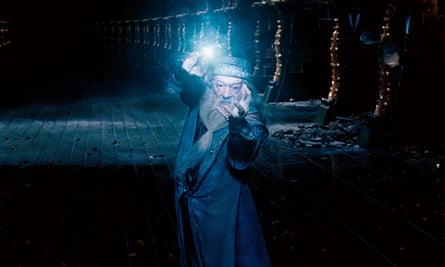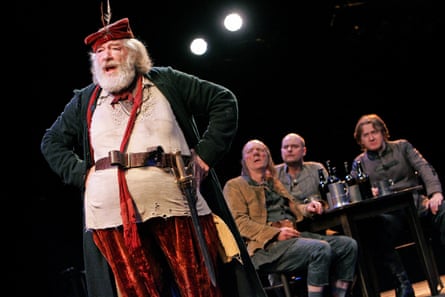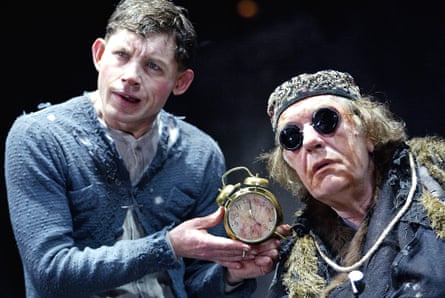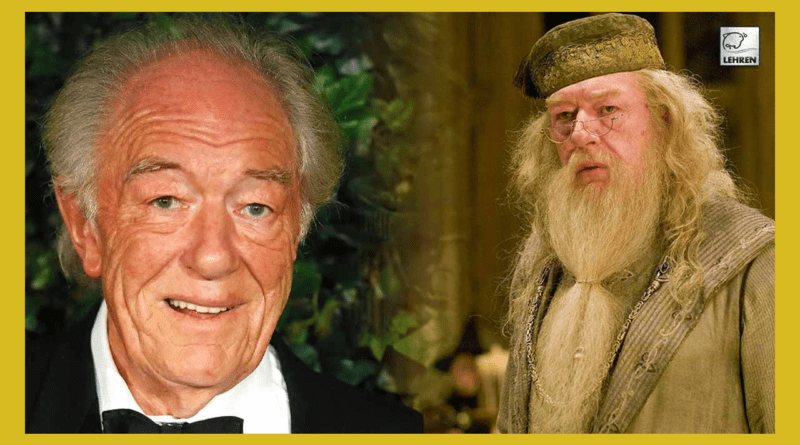Harry Potter and The Singing Detective actor “Michael Gambon” passes away at the age of 82.
The actor who won the Olivier award and played prominent roles in films like the Harry Potter series, including Albus Dumbledore, has passed away.
Sir Michael Gambon, who had a remarkable acting career that took him from Laurence Olivier’s developing National Theatre to screen parts in The Singing Detective and the Harry Potter films, passed away at the age of 82.
Publicist Clair Dobbs released a statement on behalf of his wife, Lady Gambon, and son, Fergus, saying: “We are devastated to announce the loss of Sir Michael Gambon. Following a bout with pneumonia, Michael, a devoted husband and father, passed away quietly in the hospital with his wife Anne and son Fergus by his side. Michael was 82 years old. We appreciate your expressions of love and support, but ask that you respect our need for privacy during this difficult time.
He was famously referred to as “The Great Gambon” by Ralph Richardson, and he was revered by a generation of actors. He was particularly talented in plays by Harold Pinter, Samuel Beckett, and Alan Ayckbourn. Ayckbourn remarked on Thursday, “I owe Michael a great deal. He was a fantastic theatre actor. It was an honor to observe him working on my things. It was more of an act of spontaneous combustion than what you could properly call acting.

In Arthur Miller’s A View from the Bridge, which earned Gambon an Olivier Award for his portrayal of the troubled Brooklyn docker Eddie Carbone, Ayckbourn served as his director. The Norman Conquests, an ambitious trilogy by Ayckbourn, also starred Gambon. Among his other notable performances were the title character in Brecht’s The Life of Galileo at the National Theatre in 1980 and the restaurateur paying a former lover a visit in David Hare’s Skylight, which garnered him a Tony nomination on Broadway in the mid-’90s.
Fiona Shaw, Gambon’s co-star in the Harry Potter films, described him as “a brilliant, magnificent trickster” who “varied his career remarkably and never judged what he was doing, he just played,” according to BBC Radio 4. “He just had to walk on stage and he commanded the whole audience immediately,” Dame Eileen Atkins told the BBC.

Daniel Radcliffe, who plays Harry Potter, said of Gambon in a statement to the Guardian that he is “one of the most brilliant, effortless actors I’ve ever had the honor of working with, but despite his immense talent, the thing I will remember most about him is how much fun he had while doing his job.”
He was silly irrational, and entertaining. His work was something he liked, but it didn’t seem to define him. He was a fantastic storyteller and jokester, and because he had a tendency to mix up reality with fiction while speaking with journalists, he was one of the most entertaining persons you could ever hope to go on a press junket with. I’m extremely sorry to hear about his passing, but I’m also incredibly appreciative that I was one of the fortunate people to have worked with him.
Jason Isaacs was one of those who paid tribute to him on social media, writing: “I learned what acting could be from Michael in The Singing Detective – complex, vulnerable, and utterly human.” Life of Galileo at the National Theatre was the first “theatre with a capital T” that David Baddiel had ever seen, and Gambon’s 1980 performance is still “the best stage acting I’ve ever seen,” according to Baddiel. Gambon was said to as “one of the funniest men on the planet” and “a great actor” by actor Peter Egan.
Following his triumph in Peter Greenaway’s 1989 arthouse film The Cook, the Thief, His Wife, and Her Lover, Gambon went on to play leading roles in blockbusters like Sleepy Hollow, The Insider, and Gosford Park. Then, after Richard Harris’ passing in 2002, he took on the character of Harry Potter’s professor Albus Dumbledore in many blockbusters, complete with flowing beard and tassel hat. He provided his deep voice for a variety of films, including Hail, Caesar! By the Coen brothers and both Paddington films as Uncle Pastuzo!

Gambon reportedly referred to himself as a “big, interesting old bugger” and a “wonderful, limitless machine, like a Lamborghini” whereas Ayckbourn once described him as a “wonderful, limitless machine, like a Lamborghini,” with an imposing frame and rueful features. Gambon protected his privacy and only reluctantly agreed to interviews despite being beloved by audiences and possessing a strong presence that could lend gravity to even the lightest of stuff. He stated to the Observer in 2004 that “I just plod on and try to keep my mouth shut.”
In contrast to many of his peers, Gambon did not attend theatre school and dropped out of school at the age of 15, earning experience instead by acting in community theatre performances. His father came to London after the Second World War and served as a reserve policeman; he was born there in Dublin in 1940.
At the end of the war, Gambon’s mother brought him to England to join him. They eventually relocated to Kent, where he started an engineering apprenticeship at the age of 16 in the Vickers-Armstrongs factory. He started out as a set builder in amateur theatre before landing small roles on stage at London’s Unity Theatre and Tower Theatre.
He lied about his expertise in order to get his first professional roles, making his debut in Dublin in a minor role in Othello. He made his West End debut at the age of 22 in The Bed-Sitting Room as an understudy. At the Royal Court, he also enrolled in an acting class taught by George Devine and William Gaskill.
Before acting in a Shakespeare play, Gambon claimed he had never attended one. He performed in little Shakespearean roles at the National Theatre and tried out for the company by portraying Richard III in front of Laurence Olivier, who recently and famously played the part. He performed in Hamlet featuring Peter O’Toole and Othello at the National Theatre alongside Laurence Olivier. In order to get bigger roles, including the title role in Othello, Gambon later left the National Theatre on the recommendation of Olivier and joined the Birmingham Repertory Theatre. He was thirty years old when he performed as Macbeth in a Billingham performance that he characterized as taking place in space. He appeared in Adrian Noble’s productions of King Lear and Antony and Cleopatra at the Royal Shakespeare Company in the early 1980s, sometimes both on the same day, with the latter being played at a breakneck pace.
He appeared as Falstaff in Henry IV, Parts 1 and 2 at the National Theatre in 2005, under the direction of Sir Nicholas Hytner. On Thursday, Hytner noted that Michael Gambon was “one of the last links to the great generation of actors that included Laurence Olivier and Ralph Richardson.” “His great talent was to mix Richardson’s finesse with the brutal force of Olivier. He had the ability to alternate between howling in agony and achieving a breath-taking balletic grace. In addition, he had a wicked sense of humor and was, like Falstaff (whom he played to perfection), “the cause that wit is in other men.” Stories about Gambon will go on for years, as will memories of his innumerable outstanding performances.
The star’s television shows about two quite different sleuths were huge successes. First was Dennis Potter’s role as a mystery writer hospitalized with psoriatic arthritis in the musical noir The Singing Detective. The second was a collection of Maigret thrillers, in which he portrayed the titular Parisian cop from Belgian novelist Georges Simenon. Alongside Simon Callow, he also appeared as an angel in a television adaptation of Tony Kushner’s Angels in America.
Gambon started to avoid theatre work after performing in the Samuel Beckett plays Endgame, Eh Joe, Krapp’s Last Tape, and All That Fall. He admitted to having trouble recalling his lines in 2014: “I feel sad about it. I adore the theatre, but I don’t think I could ever play a major role again. Just weeks before opening night in 2009, he withdrew due to sickness from the National Theatre’s production of Alan Bennett’s The Habit of Art, and Richard Griffiths took his place.
Some of Gambon’s best performances came from Harold Pinter’s plays, such as Jerry in Betrayal’s love triangle and the classy Hirst in No Man’s Land. Even after he ceased appearing on stage, his deep, distinctive voice could still be heard in Jamie Lloyd’s Mountain Language, part of the 2018 West End’s all-star Pinter at the Pinter season.
Share your remembrances and tributes
SOURCE

Facebook Comments